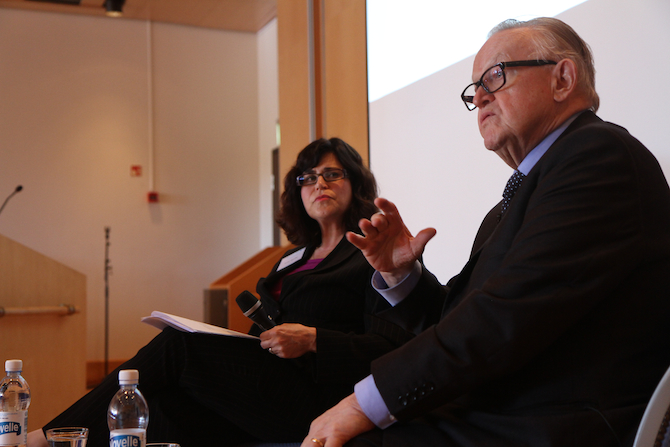CMI’s work for the past 15 years recognised in Finland’s largest newspaper
Sunday’s Helsingin Sanomat had CMI’s founder Martti Ahtisaari and executive director Tuija Talvitie in focus

Tuija Talvitie and Martti Ahtisaari. (Photo: Niko Vartiainen)
“The refugee crisis we currently face stems from our inability to resolve the gravest conflicts.” So explains CMI’s Executive Director Tuija Talvitie in an in-depth article about CMI published in Finland’s largest newspaper Helsingin Sanomat on 23 August. (Link in Finnish) ”Is it not common sense and logical to tackle the root causes of conflicts so that people wouldn’t have to leave their homes in the first place,” she asks.
CMI has been brokering peace and resolving conflicts around the world for the past 15 years. Former President of Finland Martti Ahtisaari established CMI after his presidency on this date in year 2000 (24 August).
“When my term ended Kofi Annan immediately offered me the position as UN High Commissioner for Refugees. But my friends said ‘don’t take the job, you will not be able to address the root causes of conflicts'”, Nobel Peace Prize Laureate Ahtisaari recalls.
Instead, he established CMI which today employs 70 specialists and brings conflict parties around the same table.
Working behind the scenes
The world’s conflicts are rarely resolved in public. Peace efforts require months of unofficial meetings and negotiations far away from the media, citizens and even the supporters of the conflicting parties. These unofficial negotiations and dialogue processes held under the radar are CMI’s main expertise. The aim is to build trust among the parties and search for joint solutions.
For example in Ukraine CMI brings together high-level decision-makers, Members of Verkhovna Rada (Ukrainian Parliament) and intellectual leaders. Although the participants don’t agree on many issues and may resent each other, they have with CMI’s support been able to privately sit around the same table and discuss ways to bring Ukraine back to its feet. CMI also brings the Ukrainian dialogue group together with influential Russian actors to discuss unofficially the situation in Ukraine.
Peaceful resolution of conflicts is cost-effective
CMI supports the resolution of many of the world’s worst crises at the moment. In Iraq, the organisation seeks to build confidence between the government and the opposition so that they together could focus their efforts on combating ISIS. In efforts to help resolve the bloody civil war in South Sudan, CMI has supported the work of the Tanzanian government to help South Sudan’s ruling party SPLM resolve its internal differences. These negotiations aim to complement the official IGAD-led peace process.
During the past 15 years, CMI has contributed to many peace efforts. The best known example is the Aceh peace agreement reached between the government of Indonesia and the Free Aceh movement in 2005. However, much of the work cannot be shared in public even after the negotiations have ended.
CMI is currently facing drastic cuts to its funding from the Finnish government amounting to approximately 20% of the overall turnover.
“Compared to military means, investing in mediation and conflict resolution is a highly cost-effective alternative,” Tuija Talvitie stresses.
“Although there are no ultimate guarantees that it will work, isn’t it sheer madness not to even try?”